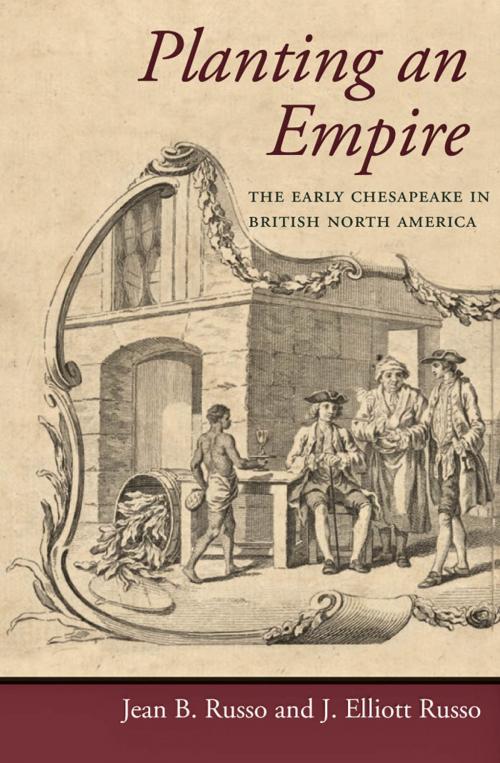Planting an Empire
The Early Chesapeake in British North America
Nonfiction, History, Americas, United States, Colonial Period (1600-1775)| Author: | Jean B. Russo, J. Elliott Russo | ISBN: | 9781421406947 |
| Publisher: | Johns Hopkins University Press | Publication: | July 2, 2012 |
| Imprint: | Language: | English |
| Author: | Jean B. Russo, J. Elliott Russo |
| ISBN: | 9781421406947 |
| Publisher: | Johns Hopkins University Press |
| Publication: | July 2, 2012 |
| Imprint: | |
| Language: | English |
Planting an Empire explores the social and economic history of the Chesapeake region, revealing a story of two similar but distinct colonies in early America.
Linked by the Chesapeake Bay, Virginia and Maryland formed a prosperous and politically important region in British North America before the American Revolution. Yet these "sister" colonies—alike in climate and soil, emphasis on tobacco farming, and use of enslaved labor—eventually followed divergent social and economic paths. Jean B. Russo and J. Elliott Russo review the shared history of these two colonies, examining not only their unsteady origins, the powerful role of tobacco, and the slow development of a settler society but also the economic disparities and political jealousies that divided them.
Recounting the rich history of the Chesapeake Bay region over a 150-year period, the authors discuss in clear and accessible prose the key developments common to both colonies as well as important regional events, including Maryland's "plundering time," Bacon’s Rebellion in Virginia, and the opening battles of the French and Indian War. They explain how the internal differences and regional discord of the seventeenth century gave way in the eighteenth century to a more coherent regional culture fostered by a shared commitment to slavery and increasing socio-economic maturity.
Addressing an undergraduate audience, the Russos study not just wealthy plantation owners and government officials but all the people involved in planting an empire in the Chesapeake region—poor and middling planters, women, Native Americans, enslaved and free blacks, and non-English immigrants. No other book offers such a comprehensive brief history of the Maryland and Virginia colonies and their place within the emerging British Empire.
Planting an Empire explores the social and economic history of the Chesapeake region, revealing a story of two similar but distinct colonies in early America.
Linked by the Chesapeake Bay, Virginia and Maryland formed a prosperous and politically important region in British North America before the American Revolution. Yet these "sister" colonies—alike in climate and soil, emphasis on tobacco farming, and use of enslaved labor—eventually followed divergent social and economic paths. Jean B. Russo and J. Elliott Russo review the shared history of these two colonies, examining not only their unsteady origins, the powerful role of tobacco, and the slow development of a settler society but also the economic disparities and political jealousies that divided them.
Recounting the rich history of the Chesapeake Bay region over a 150-year period, the authors discuss in clear and accessible prose the key developments common to both colonies as well as important regional events, including Maryland's "plundering time," Bacon’s Rebellion in Virginia, and the opening battles of the French and Indian War. They explain how the internal differences and regional discord of the seventeenth century gave way in the eighteenth century to a more coherent regional culture fostered by a shared commitment to slavery and increasing socio-economic maturity.
Addressing an undergraduate audience, the Russos study not just wealthy plantation owners and government officials but all the people involved in planting an empire in the Chesapeake region—poor and middling planters, women, Native Americans, enslaved and free blacks, and non-English immigrants. No other book offers such a comprehensive brief history of the Maryland and Virginia colonies and their place within the emerging British Empire.















